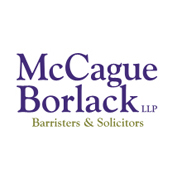By Martin Smith
Introduction
In Matlock v. Ottawa-Carleton Standard Condominium Corporation,1 McCague Borlack LLP's Martin Smith, on behalf of the Defendants, successfully opposed the Plaintiff's motion to amend his Statement of Claim to enhance his claim against the individual board member Defendants and add an additional board member as a party. In response, the Defendants also advanced a crossclaim striking the claims against the board member Defendants in their entirety.
The issue before the Ontario Superior Court of Justice was whether the Plaintiff's proposed Amended Statement of Claim plainly and obviously disclosed a reasonable cause of action against the board member Defendants.
Background Facts
The Plaintiff claimed that after he purchased his condominium unit, he discovered various deficiencies including problems with the elevators, the heat actuator controllers, the fire suppression system, the masonry, flooding, sewer gas as well as poor cleaning services.
In the initial Statement of Claim, the Plaintiff not only claimed against the Condominium Corporation but also against several board members personally. However, the board member Defendants asserted that the pleadings had not established a reasonable cause of action against them personally and advised that they would move to strike the claim against them. The Plaintiff responded by proposing amendments to the Statement of Claim. These amendments attempted to strengthen the claim against the board member Defendants and add a board member as an additional Defendant.
No Reasonable Cause of Action is Found Against the Board Member Defendants
The Plaintiff cannot simply extend their claim to include individual board members... |
Past case law2 asserts that Plaintiffs must differentiate allegations levelled against a corporation from those against the personal Defendants to have a successful claim. The Plaintiff cannot simply extend their claim to include individual board members concerning undisclosed efficiencies or a failure to repair deficiencies. To establish personal liability for employees or officers of limited companies, it must be determined that they acted in a way that was tortious or presented a separate interest that was distinct from the company. Claims against personal Defendants are subject to higher scrutiny. In ScotiaMcLeod Inc. v. Peoples Jewellers Ltd.,3 the court asserted that unless there is evidence of “fraud, deceit, dishonesty or want of authority on the part of employees or officers,” it is unlikely that officers or employees of limited companies will be found personally liable.
In this case, the Court concluded that there was nothing in the pleadings to suggest that the conduct of the personal Defendants was distinctly tortious or separate from the actions of the Condominium Corporation. Although, the Plaintiff tried to separate the two claims by stating that the claim against the Condominium Corporation resulted from its failure to disclose deficiencies and repair various common elements, whereas the claim against the personal Defendants resulted from alleged negligence in their decision-making process. It was the Court’s view that:
Given that a corporation is an inanimate piece of legal machinery incapable of thought or action, the Court can only determine its legal liability by assessing the conduct of those who caused the company to act in the way that it did. The liability of the Condominium Corporation flows from the decision making of the individuals. There is no real distinction.4
Therefore, the Court held that it was plain and obvious that the Plaintiff could not succeed against the individual board member Defendants in the action as originally pleaded or in the proposed amendments and the claims were stuck from the pleadings.
Claims Must Particularize and Differentiate Allegations Against Each of the Defendants
Case law asserts that any claim against personal Defendants must be individually pleaded. The Plaintiff cannot make blanket allegations against the Defendants, as this does not allow for the personal Defendants to sufficiently understand the case against them to raise an effective defence. Therefore, where claims are unparticularized and undifferentiated, that alone is sufficient to strike a claim.5
In this case, with the expectation of one Defendant, the pleadings consist of the same allegations against all Defendants. Even the effort made to refine the pleadings concerning negligence in the Amended Statement of Claim lumps together the Defendants without differentiating material facts that could support a claim against each individual. Therefore, the Court asserted that any allegations against the personal Defendants that are lumped together without distinguishing material facts against each individual ought to be struck.
...the Plaintiff's proposed amendments were wholly deficient to establish a ... |
Conclusion and Takeaway
The Court ruled that the Plaintiff's proposed amendments were wholly deficient to establish a reasonable cause of action against the individual defendant board members. As such, the Court did not allow the Plaintiff to amend his Statement of Claim and the pleadings against the personal Defendants were struck in their entirety.
From the defence perspective, the decision highlights the importance of reviewing the pleadings to ascertain if allegations levelled against personal Defendants are distinct from those against the corporation. If a Plaintiff is advancing a claim which is not properly pled in the Statement of Claim, the defence may be able to strike the pleadings where no reasonable cause of action has been established.
From the subrogation perspective, this decision highlights that if you are advancing a claim against personal Defendants, it is essential to ensure that the pleadings sufficiently differentiate the allegations against a corporation from those against the personal Defendants in the claim.
Read the full decision.
- Matlock v. Ottawa-Carleton Standard Condominium Corporation, 2021 ONSC 390 [Matlock].
- Toronto Standard Condominium Corp. No. 2123 v. Times Group Corp., 2018 ONSC 4799 (CanLII).
- ScotiaMcLeod Inc. v. Peoples Jewellers Ltd., (1995), 26 O.R. (3d) 481 (Ont. C.A.) [ScotiaMcLeod].
- Matlock, supra, note 1 at para 31.
- ScotiaMcLeod, supra, note 3 at para. 23.


